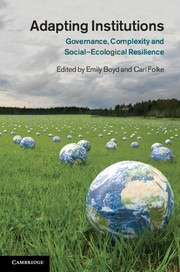Book contents
- Frontmatter
- Contents
- Illustrations
- Contributors
- Foreword
- Acknowledgements
- Acronyms and abbreviations
- 1 Adapting institutions, adaptive governance and complexity: an introduction
- Part I Adapting local institutions, networks, leadership and learning
- Part II Adapting and governing public institutions for uncertainty and complexity
- Part III Adapting multi-level institutions to environmental crisis
- 9 Double complexity: information technology and reconfigurations in adaptive governance
- 10 Adaptive governance and natural hazards: the 2004 Indian Ocean tsunami and the governance of coastal ecosystems in Sri Lanka
- 11 Adapting to global climate change: evaluating resilience in two networked public institutions
- 12 Conclusions: adapting institutions and resilience
- Index
- References
12 - Conclusions: adapting institutions and resilience
from Part III - Adapting multi-level institutions to environmental crisis
Published online by Cambridge University Press: 05 November 2011
- Frontmatter
- Contents
- Illustrations
- Contributors
- Foreword
- Acknowledgements
- Acronyms and abbreviations
- 1 Adapting institutions, adaptive governance and complexity: an introduction
- Part I Adapting local institutions, networks, leadership and learning
- Part II Adapting and governing public institutions for uncertainty and complexity
- Part III Adapting multi-level institutions to environmental crisis
- 9 Double complexity: information technology and reconfigurations in adaptive governance
- 10 Adaptive governance and natural hazards: the 2004 Indian Ocean tsunami and the governance of coastal ecosystems in Sri Lanka
- 11 Adapting to global climate change: evaluating resilience in two networked public institutions
- 12 Conclusions: adapting institutions and resilience
- Index
- References
Summary
Introduction
This book has examined adapting institutions, adaptive governance and complexity from the perspective of social–ecological resilience. As stated in the introduction, we have been interested in exploring and understanding social–ecological features involved in adaptations that may help societies move towards sustainability, across a range of scales from local to global. These scales are interdependent. We have in particular looked at adapting institutions and sources of social–ecological resilience to features of change, such as shocks and surprises, through a set of case studies to assess what adaptations have emerged at local, state and global levels.
We have combined resilience thinking with research on adapting institutions and governance challenges. Through the case studies the content is rooted in reality, complemented with conceptual contributions and the move in ideas towards adapting institutions with new pathways of development for dealing with complexity and sustainability (Folke et al. 2010, Olsson et al. 2010).
- Type
- Chapter
- Information
- Adapting InstitutionsGovernance, Complexity and Social-Ecological Resilience, pp. 264 - 280Publisher: Cambridge University PressPrint publication year: 2011



